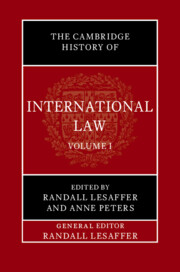Book contents
- The Cambridge History of International Law
- The Cambridge History of International Law
- Frontispiece
- The Cambridge History of International Law
- Copyright page
- Contents
- Plates
- Tables
- Contributors
- Preface
- 1 Scope, Scale and Humility in the History of International Law
- Part I The Historiography of International Law
- Part II The Historiography of International Law
- 6 The Historiography of International Law in East Asia
- 7 The Historiography of International Law in Sub-Saharan Africa
- 8 Historiography of International Law on the European Continent
- 9 The Historiography of International Law in Russia and Its Successor States
- 10 ‘The Most Neglected Province’
- 11 The View from the US Leviathan
- 12 Using History in Latin America
- Index
- Plate Section (PDF Only)
- References
8 - Historiography of International Law on the European Continent
from Part II - The Historiography of International Law
Published online by Cambridge University Press: 06 December 2024
- The Cambridge History of International Law
- The Cambridge History of International Law
- Frontispiece
- The Cambridge History of International Law
- Copyright page
- Contents
- Plates
- Tables
- Contributors
- Preface
- 1 Scope, Scale and Humility in the History of International Law
- Part I The Historiography of International Law
- Part II The Historiography of International Law
- 6 The Historiography of International Law in East Asia
- 7 The Historiography of International Law in Sub-Saharan Africa
- 8 Historiography of International Law on the European Continent
- 9 The Historiography of International Law in Russia and Its Successor States
- 10 ‘The Most Neglected Province’
- 11 The View from the US Leviathan
- 12 Using History in Latin America
- Index
- Plate Section (PDF Only)
- References
Summary
The art and craft of writing history are inherently linked with international-law scholarship. Finding precedents and doctrinal authority and reading the political compromises underpinning institutions are typical purposes. Lawyers, academics and political actors have all been receptive to a historical narrative. The structure and arguments used in international law are closely linked with Western legal culture and the reception of Roman law. This setting is at the same time broader and more restrictive than that of professional academic historians, who developed theoretical standards to distinguish their thought-through production (historia rerum gestarum) from the rendering of brute facts (res gestae) or from a purely literary product. This chapter starts with German and French eighteenth-century visions of the law of nations, before passing to the nineteenth-century passion for history. The ‘men’ of 1873 (Institute of International Law) and twentieth-century evolutions led to the recent boom in scholarship. The ‘turn to history’ in international law not only continues past traditions, but also reflects broader transformations in the social sciences and humanities. Conversely, we witness a contemporary ‘turn to law’ in intellectual, political, cultural and social history, which leads to a stimulating process of cross-fertilisation.
- Type
- Chapter
- Information
- The Cambridge History of International Law , pp. 244 - 272Publisher: Cambridge University PressPrint publication year: 2024

